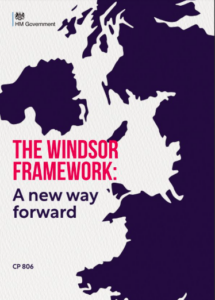By Hannah Kerfoot
Urgent reminder of the Windsor Framework: the deadline is approaching! This is especially important for all medicines manufacturers with a current PLNI and PLGB licence. They need to urgently to cancel their PLNI to be automatically converted to a UK licence. Read on to find out more…
What is th e Windsor framework?
e Windsor framework?
The Windsor Framework is a post-Brexit legal agreement which modifies the current ‘Northern Ireland Protocol’.
Great Britain (GB) includes only England, Wales and Scotland; the United Kingdom (UK) includes those countries plus Northern Ireland. Following Brexit, the Republic of Ireland (the rest of Ireland that is not Northern Ireland) remained in the EU but the UK left, leaving Northern Ireland outside of the EU but attached without any border.
Currently, while the Northern Ireland Protocol allows for the easy trade between Northern Ireland and the Republic of Ireland (and thus the EU’s single market), goods and commerce from Great Britain need to go through many controls and checks.
What is the purpose of the Windsor framework?
This framework seeks to resolve the potential issues arising from the Northern Ireland Protocol and bring clarity to the trade of goods and commerce between the UK and the EU.
When does it come into effect?
The Windsor Framework itself came into effect on the 1st of October 2023, however the UK government has revised the framework’s operation since then, and these revisions will come into effect on the 1st of January 2025.
How will it affect medicines regulations in the UK?
In terms of how it affects legislation surrounding medicines and the pharmaceutical industry, this framework introduces new rules in the UK for product labelling and licensing.
It will also standardise the packaging across the UK and ensure that the same medicines are available UK-wide.
Previously, innovative products have been approved by the EU under the centrally authorised procedure. Under the revisions to the framework, future authorisations approved by the EU will not apply to products in the UK. Previously the Irish Medicines Board (IMB) regulated medicines in Northern Ireland and The Republic of Ireland. Licensing will now be different. All products for the UK will be authorised by MHRA and therefore they will be under schedule 12A of the Human Medicine Regulations (2012).

How will it affect medicinal legislation in Northern Ireland?
The implementation of the Windsor framework will mean that EU legislation relating to new and innovative medicines will no longer apply to Northern Ireland and they will be governed by UK law.
What is going to change?
Firstly, all medicines that are licenced in the UK will have “UK Only” printed somewhere on their external packaging. Some companies are achieving this with over-stickers on the outside packaging, to avoid having to replace stock that is already manufactured and has not yet been distributed. So expect to see some medications with this printed on as a sticker for the first half of 2025.
MHRA have accepted that some product will already have been distributed, for example to pharmacies, and have allowed this to continue to be used. They have stated: “Any stock in existing packaging already placed on the market (in Great Britain and Northern Ireland) can continue to be supplied to patients in the relevant territory until the date of expiry.”
Pending GB-wide Marketing Authorisation applications that are already in process will be granted with UK-wide validity once approved, which means there is nothing extra needed from the applicant. The same is true for applicants who hold a current “PLGB” licence only. These licenses will become “UKPL” automatically as of the 1st of January 2025.
One thing to watch out for, however, is medicines that have a Northern Irish product licence as well as a Great British product licence. These are intended by the MHRA to be streamlined into a single new “UKPL”, which will apply for the whole of Great Britain and Northern Ireland. “PLNI” and “PLGB” authorisations cannot coexist for the same product after 1 January 2025, therefore, the applicant must send notice of cancellation of the “PLNI” before the “PLGB” can be converted to a “UKPL”. If they fail to do so, the “PLGB” will be cancelled, leading to the applicant being made to reapply. This will cause a lot of work for manufacturers if they forget to cancel the PLNI licence, whereas if they remember to do so they will automatically be granted a UKPL.
So, it is important ensure you stay on top of your paperwork and the guidelines in this time of changing regulations!